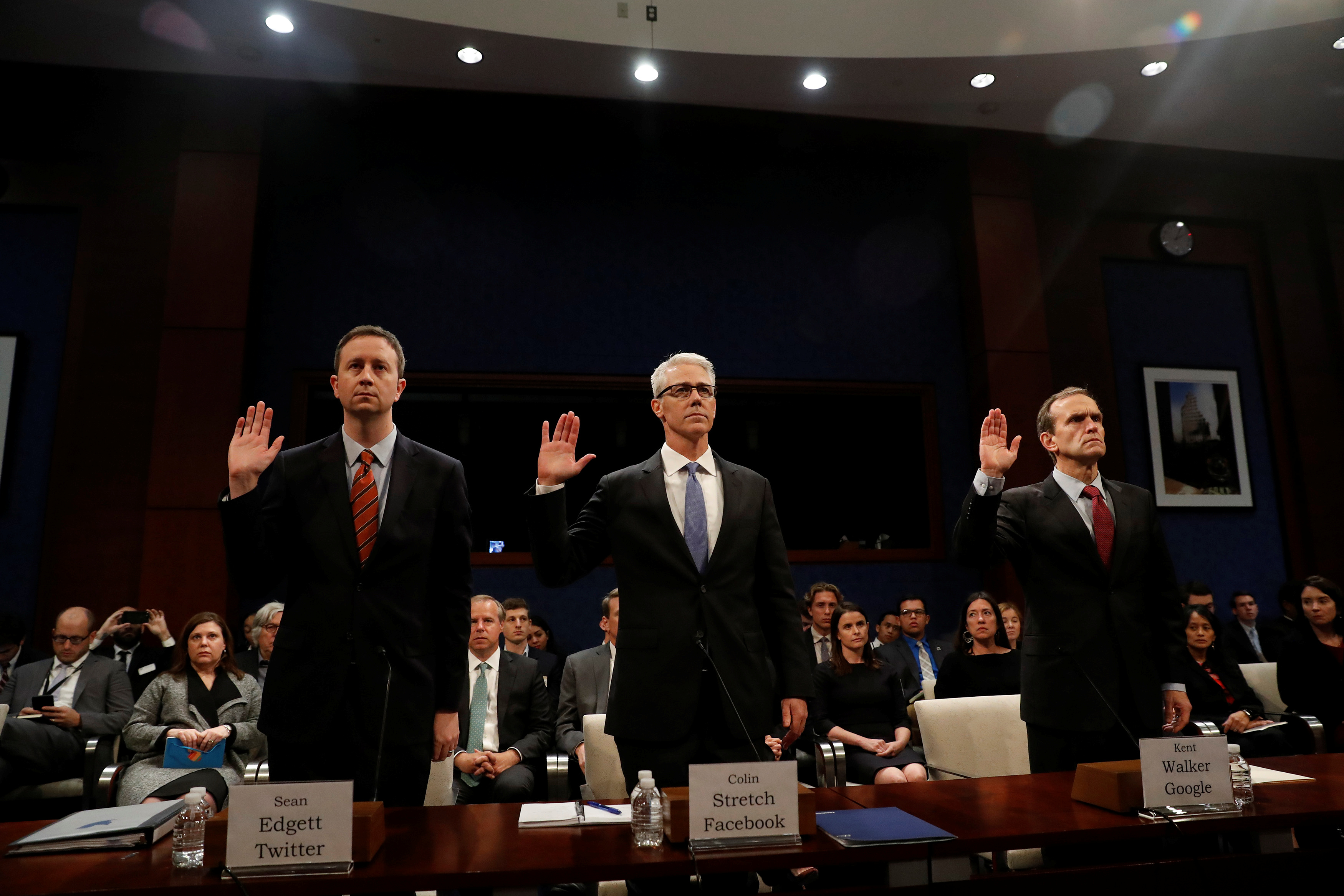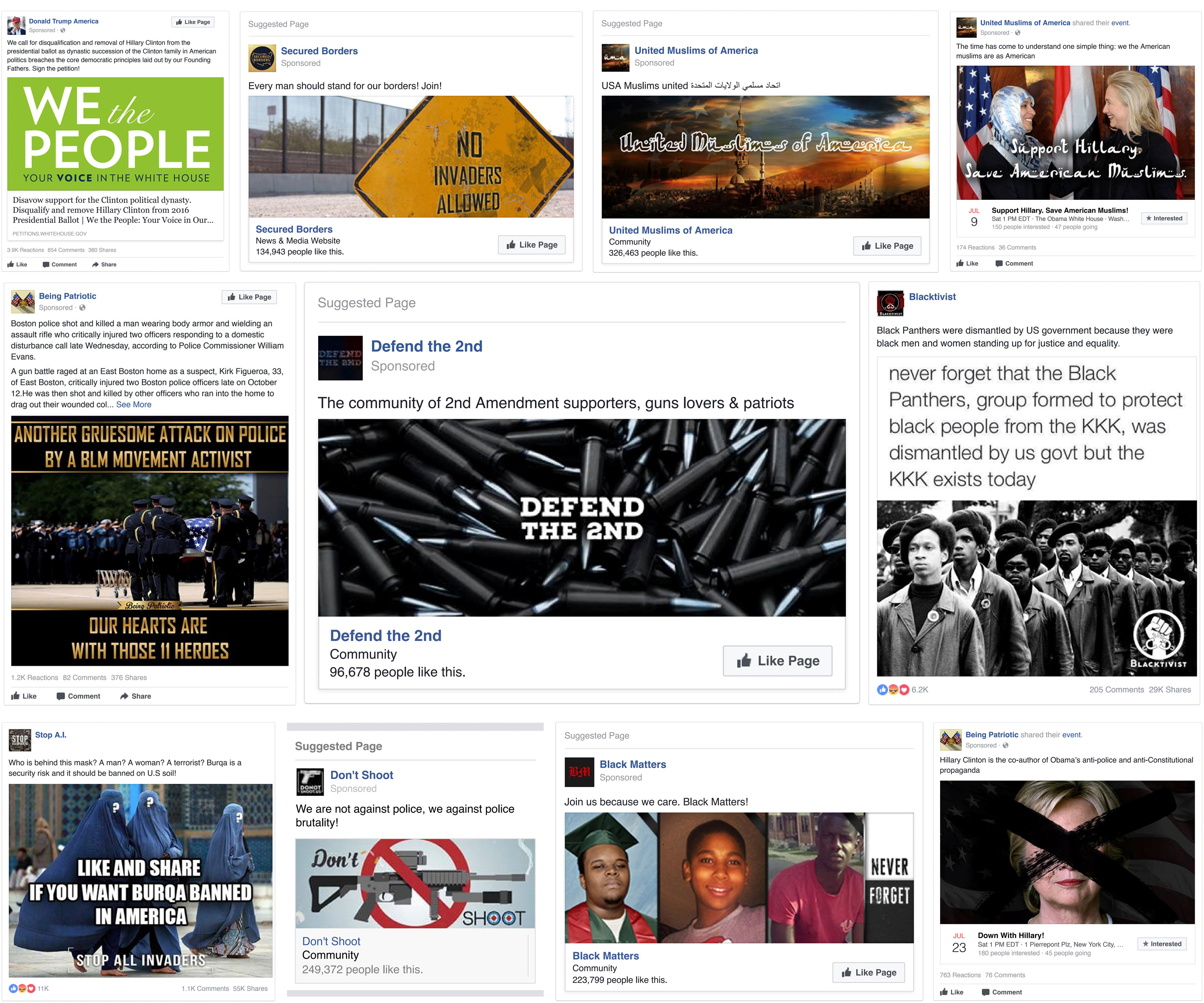
By Dustin Volz
WASHINGTON (Reuters) – U.S. lawmakers released a batch of Russian-bought Facebook Inc ads on Wednesday that showcased politically charged content allegedly spread on social media by Moscow ahead of the 2016 U.S. election.
Some of the ads criticized candidates, while others sought to organize or promote simultaneous rallies for opposite sides of divisive issues. The sample posted on a House committee website pulled from the roughly 3,000 ads Facebook provided to congressional investigators last month.
Tech companies recently acknowledged that Russia-based content on U.S. politics and social issues like gun rights, immigration, religion and race had spread on their platforms before and after the election.
Some of the ads sampled specifically dealt with the U.S. election and were critical of Democratic candidate Hillary Clinton. One from an account called “Army of Jesus” said Clinton was supported by evil forces.
“Hillary is a Satan, and her crimes and lies had proved just how evil she is,” the post read. It added that Republican candidate Donald Trump was “an honest man” who “cares deeply for this country.”
Other ads appeared to be aimed at setting up clashes over hot-button issues.
One ad from a group calling itself “Heart of Texas” promoted a rally in Houston on May 21, 2016 to “Stop Islamization” in the U.S. state. Another ad from a separate Facebook page promoted a pro-Islam rally at the same time and venue.
The Russian government has denied any attempts to sway the 2016 election, in which U.S. President Donald Trump defeated Clinton.
The ads were released at a U.S. House Intelligence Committee hearing, where lawyers from Facebook, Twitter Inc and Alphabet Inc’s Google testified about Russian influence on their networks.
It was the second straight day the companies attempted to ward off criticism from lawmakers that they were slow to respond to Russian abuse.
Facebook, the world’s largest social media network, again came under the most scrutiny from lawmakers, who expressed frustration with the company because of its role in targeted marketing.
Facebook General Counsel Colin Stretch told the committee that 16 million Americans may have been exposed to Russian information on Facebook’s picture-sharing service Instagram beginning in October 2016. The election was on Nov. 8.
An additional four million may have seen such material on Instagram before October, though that data was less complete, Stretch said.

Twitter Acting General Counsel Sean Edgett, Facebook General Counsel Colin Stretch and Google Senior Vice President and General Counsel Kent Walker are sworn in before the House Intelligence Committee to answer questions related to Russian use of social media to influence U.S. elections, on Capitol Hill in Washington, U.S., November 1, 2017. REUTERS/Aaron P. Bernstein
‘YOU FAILED’
The Instagram figures were in addition to the 126 million Americans who may have seen Russian-backed political content on Facebook over a two-year period, a number the company disclosed earlier this week.
The companies’ visit to Washington this week reflected shifting political fortunes for the U.S. tech industry, which after decades of relatively little regulatory scrutiny is now on the defensive on a range of policy issues.
“In the past election, you failed,” said Democratic Senator Ron Wyden, who normally is considered a strong ally of Silicon Valley.
U.S. intelligence agencies have concluded that Russia interfered in the campaign, including through social media, to try to influence the vote in favor of Trump.
A U.S. Justice Department special counsel and several congressional panels are investigating Russian meddling and any potential collusion by Trump’s campaign.
Trump has said there was no collusion with Moscow ahead of the election.
Democrats and Republicans both said in Wednesday’s Senate intelligence hearing that the tech companies need to do more to police against foreign government abuse on their platforms.
Some Republicans, however, sought to distance that scrutiny from questions about the legitimacy of Trump’s election victory.
Richard Burr, the Republican chairman of the panel, said it was impossible to measure the impact or know the motivation of the Russian operation to spread political material on social media.
Any conclusions that Trump benefited from Russia, perhaps in a decisive way, to win the White House ignored the complexity of the issue, Burr said.
“I’m here to tell you this story does not simplify that easily,” he said.

A combination of social media posts, which were provided to the House Intelligence Committee during a hearing on Russian use of social media to influence U.S. 2016 presidential elections, is seen after their release in Washington, D.C. U.S. November 1, 2017. Social Media/Handout via REUTERS
‘UNDERESTIMATING’ THE PROBLEM
Some Republicans also sought to portray the amount of Russian content as miniscule compared to the total amount of political material online.
The campaigns of Trump and Clinton spent a combined $81 million on Facebook ads, Stretch said, compared to about $46,000 in ad buys from the Internet Research Agency, a suspected Russian troll farm.
Senator Mark Warner, the top Democrat on the panel, said he was disappointed the companies appeared be confining reviews to information linked to the Internet Research Agency, and suggested there could have been far more undetected Russian content.
Some senators criticized the companies for sending lawyers, not chief executives, to testify.
“If we go through this exercise again, we would appreciate seeing the top people who are making the decision,” said Senator Angus King, an independent.
(Reporting by Dustin Volz; Additional reporting by David Ingram; Editing by Frances Kerry and Meredith Mazzilli)





